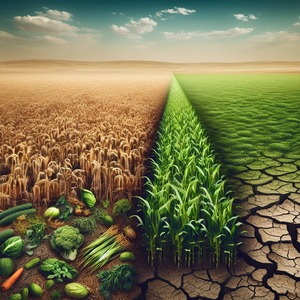The Digital Nomad Conservationist: Bridging Public Lands Expertise and Online Innovation

Traditionally, conservation work has been deeply rooted in physical, on-the-ground efforts. Public lands managers have spent their careers restoring ecosystems, managing protected areas, working closely with local communities, and enforcing policies aimed at preserving natural resources. While these roles are critical, they often come with geographic limitations, rigid schedules, and, at times, financial instability—especially in cases where layoffs disrupt career trajectories. However, the digital age has transformed virtually every field, including conservation. With the increasing global demand for sustainability knowledge and the rise of online platforms, conservationists now have opportunities to share their expertise on a global scale. Blogs, YouTube channels, podcasts, e-learning platforms, and social media have become powerful tools for education and advocacy. For former public lands managers, this shift presents a chance to not only continue their mission of protecting the planet but also to innovate and expand their impact beyond traditional boundaries.
Paths to Becoming a Digital Nomad Conservationist
One of the most straightforward ways to transition into digital nomadism is through freelance environmental writing and content creation. Public lands managers possess a wealth of knowledge about ecosystems, sustainability, and conservation challenges—making them ideal candidates for creating engaging, informative content. For example, a former Bureau of Land Management (BLM) professional could develop a blog that demystifies land-use policies or offers eco-friendly travel guides for visitors to national parks. Similarly, they could produce YouTube videos or Instagram reels showcasing the biodiversity of protected areas while emphasizing the importance of preservation. Platforms like Medium or Substack allow for monetization of articles, while Patreon can help creators generate income through subscriber-based content. Another lucrative avenue is remote environmental consulting, where former public lands managers can offer their expertise to companies, nonprofits, and government agencies. Organizations are increasingly seeking guidance on sustainability initiatives, land-use planning, and environmental compliance, and former public lands professionals are uniquely positioned to meet this demand. By creating a professional website or LinkedIn profile showcasing their skills, individuals can attract clients from around the world. Remote consulting platforms like Upwork and Toptal also provide opportunities to connect with organizations seeking specialized environmental knowledge. This career path allows digital nomad conservationists to contribute to meaningful projects from anywhere in the world. For those with entrepreneurial ambitions, building an online conservation brand can be an incredibly rewarding way to merge passion and profit. By creating a unique niche, such as offering online courses on resource management or selling eco-friendly products, former public lands managers can cultivate a global audience. A growing trend is the use of subscription models like Patreon, where creators share in-depth resources, host virtual workshops, or provide exclusive access to educational content. The flexibility of digital nomadism also allows for participation in international conservation collaborations. Many global conservation organizations operate virtually, offering opportunities for remote project management, research, and consulting. Former public lands managers can contribute to projects focused on reforestation, biodiversity preservation, or carbon offset initiatives—leveraging their expertise to make a tangible impact.
Success Stories in the Field
The digital nomad conservationist movement is already gaining traction, with inspiring examples of individuals who have successfully transitioned from traditional conservation roles to digital careers. John Davis, a former national park manager, now educates millions on YouTube about biodiversity hotspots and conservation challenges, combining his expertise with visually compelling content. Sarah Thompson, by leveraging her background in environmental planning, launched a successful consultancy that serves a wide range of clients globally, from urban developers to rural communities. Emma Rivera, a former wildlife biologist, pivoted to creating online courses on species identification and habitat restoration, earning a steady income through her e-learning platform while advocating for conservation.
Challenges and How to Overcome Them
The transition to becoming a digital nomad conservationist is not without its challenges. Building an audience or client base from scratch requires significant time, effort, and persistence. Additionally, staying updated on digital tools, trends, and remote work practices is essential for success. Solutions include investing in digital skills like website design, social media marketing, and video editing to create polished, professional content. Networking effectively by joining online conservation communities, attending webinars, and collaborating with like-minded professionals can expand one's reach. Starting small with part-time projects or freelance gigs can help gain experience and build credibility in the digital space.
The digital nomad conservationist is a testament to how innovation and adaptability can transform traditional careers. For former public lands managers, this path offers a unique opportunity to blend a lifelong passion for conservation with the flexibility and global reach of the digital age. Whether through freelance writing, remote consulting, or building an online brand, digital nomadism provides a platform to inspire and educate the world about sustainability. As the demand for environmental expertise continues to grow, the possibilities for digital nomad conservationists are endless. By taking the leap, former public lands managers can redefine their careers, make a lasting impact, and help bridge the gap between people and the natural world—one digital connection at a time.
Environmental Content Creator
Nonprofits, environmental advocacy organizations, or freelance platforms like Medium or YouTube
Responsibilities
Develop engaging content (blogs, videos, or podcasts) focused on conservation, sustainability, or public lands management.
Create how-to guides, educational resources, or storytelling pieces to inspire environmental stewardship.
Skills/Qualifications
Strong writing or multimedia production skills; expertise in conservation-related topics; proficiency in social media and SEO strategies for audience growth.
Unique Skills Needed
Ability to translate complex environmental concepts into accessible, engaging content for diverse audiences.
Remote Environmental Consultant
Urban planning firms, conservation organizations, or private consultancies
Responsibilities
Advise companies, governments, or NGOs on sustainable land-use practices, environmental compliance, or conservation strategies.
Conduct virtual assessments and provide actionable recommendations.
Skills/Qualifications
Background in environmental planning, policy analysis, or ecological management.
Strong communication and project management abilities.
Familiarity with software like GIS or environmental impact modeling tools.
Unique Skills Needed
Expertise in virtual collaboration and the ability to adapt traditional field-based knowledge to remote, data-driven consulting.
Online Environmental Educator
Educational platforms, environmental nonprofits, or self-employment as an independent instructor
Responsibilities
Create and deliver virtual courses or webinars on topics such as biodiversity, habitat restoration, or sustainable practices.
Develop e-learning materials for individuals, schools, or organizations.
Skills/Qualifications
Teaching or public speaking experience; knowledge of e-learning platforms like Teachable, Kajabi, or Coursera.
Strong organizational and curriculum development skills.
Unique Skills Needed
Ability to create interactive, visually compelling learning experiences and tailor content for online learners.
Sustainability Project Coordinator (Remote)
Global conservation organizations, international development agencies, or sustainability-focused businesses
Responsibilities
Manage and support sustainability initiatives, such as carbon offset programs, reforestation projects, or corporate ESG (Environmental, Social, and Governance) strategies.
Track project milestones and ensure alignment with conservation goals.
Skills/Qualifications
Experience in project management and environmental science.
Proficiency in tools like Asana or Trello for remote team coordination.
Familiarity with sustainability certifications or reporting frameworks (e.g., GRI or LEED).
Unique Skills Needed
Cross-cultural communication and the ability to manage remote, interdisciplinary teams.
Ecotourism Content Specialist
Eco-tour companies, travel blogs, or sustainable tourism organizations
Responsibilities
Develop travel guides, itineraries, or marketing campaigns for eco-conscious travel companies.
Highlight sustainable destinations, provide tips for low-impact travel, and advocate for conservation through tourism.
Skills/Qualifications
Background in ecology, tourism, or communications.
Strong storytelling and marketing skills, with proficiency in tools like Canva or HubSpot for content creation.
Unique Skills Needed
Knowledge of eco-certifications and practices, and the ability to craft content that balances environmental advocacy with travel appeal.


